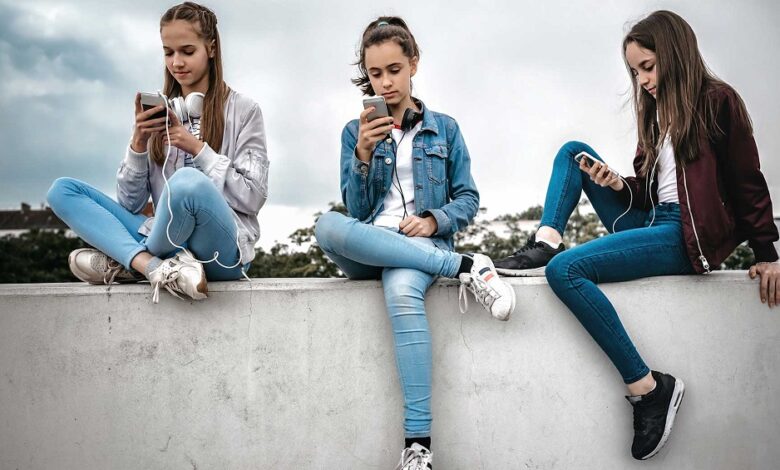
Studies over the years have established that adequate sleep is essential for proper brain development and emotion regulation, especially in children during their early formative years. However, in today’s 24×7 digital world, excessive screen use is increasingly replacing quality sleep time, and lowering brain activities that better enhance cognitive abilities in people, in particular among adolescents..
Previous studies on the pervasive influence of social media platforms show that in many countries nearly half of the teens are online almost constantly. Because neural emotion and reward networks in the brain mature earlier than inhibitory control and executive function networks, adolescents are at a particularly high risk of developing mental health and sleep problems.
A new study, by researchers at the Stanford Research Institute (SRI) in the United States, has provided fresh insight into how two significant aspects of modern adolescent life — excessive social media usage and sleep of short duration — impact brain- behavior interactions in adolescents.
The researchers analyzed data on 1982 adolescents, ages 10-14 years, half of whom were girls, from the Adolescent Brain Cognitive Development (ABCD) study conducted by the National Institutes of Health (NIH) in the US. Sleep duration and recreational social media usage among teens were assessed using responses to standardized lifestyle questionnaires and surveys. Brain activities were analyzed from functional Magnetic Resonance Imaging (fMRI) scans that targeted regions of the brain associated with reward processing and executive functions..
The study findings showed a significant correlation between greater social media usage and sleep of shorter duration. Analysis of brain activity using fMRI scans also showed that higher social media use was associated with lower activation in the inferior and middle frontal gyrus regions of the brain, which are mainly involved in executive control and reward processing.
The results suggest that responses of adolescents to rewards may be influenced by their sleep habits and social media use. A better understanding of the specific brain regions involved in these interactions can help identify potential risks and benefits associated with digital engagement and sleep habits. This is especially important as it could guide the development of more precise, evidence-based interventions aimed at promoting healthier habits.
Social scientists and activists point out that most social media businesses use various digital techniques such as the ubiquitous ‘ infinite scrolling’ feature to keep people glued to their platforms for the longest possible time. Warning of the dangers of excessive screen-time, several activists have urged the government to introduce regulations that prohibit the use of such ‘black-hat’ tactics, especially when these sites target children.
The American Academy of Sleep Medicine (AASM) recommends that teenagers 13 to 18 years of age should sleep 8 to 10 hours on a regular basis, and encourages adolescents to disconnect from all electronic devices at least 30 minutes to an hour before bedtime.Teens who spend more than three hours a day using social media have double the risk of mental health problems, including depression and anxiety.
In a recent survey, nearly half of the adolescent respondents said that social media made them feel worse about their bodies, while 32 percent said social media negatively affected their grades in school. A Gallup poll conducted in 2023, showed that American teens spend an average of 4.8 hours a day on social media platforms such as TikTok, Instagram, and YouTube.
The new study and other research on the harmful impact of excessive social media usage on the health and well-being of people, recently prompted the United States Surgeon General to call on Congress to legislate a law making it mandatory for social media platforms to carry a warning label on the harm they pose to the mental health of children and teens.
A warning label, if legislated by US Congress would serve to regularly remind parents and adolescents that social media has not been proven safe. Similar labels, which appear on tobacco and alcohol products have been found effective in increasing people’s awareness on the harms of smoking and drinking, and helping them change behavior, said the Surgeon-General in a NewYork Times op-ed published in June this year.
In this regard it is noteworthy that in 1965, the US Congress voted to require that cigarette packages distributed in the United States carry a warning that said that cigarette smoking “may be hazardous to your health.” Smoking rates have dropped since then; in 1954, around 45 percent of Americans were smokers; however, by 2023, the rate had dropped to less than 12 percent.
Social scientists point out that the decrease in tobacco use since 1954 was not just due to the warning label, as the introduction of a warning label was also accompanied by a huge public health campaign and other significant efforts to get people to reduce or quit smoking tobacco. While a warning label on its own would not make social media safe for young people, it is certainly a step in the right direction, which could be further enhanced through effective media campaigns.
While the study on the impact of social media usage, sleep patterns, and brain activation in adolescents, as well as the US Surgeon-General’s call for warning labels on social media sites, pertains to the United States, the study’s findings are equally applicable everywhere, Public health activists and healthcare practitioners in many countries have supported the US Surgeon-General’s call to compel social media sites to display warning labels against excessive use of such platforms.
Policymakers and technology companies need to take steps to protect the safety and health of children and teens everywhere. Telecommunication regulators can begin by banning the sending of ‘suggested post’ notifications to minors between midnight and 6am without consent from their parents. Tech companies were also asked to share their data on the health effects of social media platforms with the public and researchers, as well as to allow independent audits of their platform.
To protect children’s sleep and encourage in-person social connections, parents and teachers should also do their part. Parents can support healthy social media use by creating phone-free zones around meals, bedtime, and social gatherings, while schools should work to create a phone-free educational environment.












